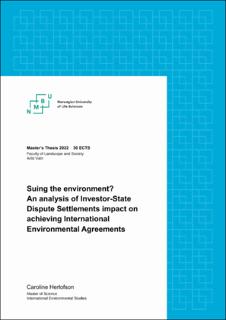| dc.contributor.advisor | Vatn, Arild | |
| dc.contributor.author | Herlofson, Caroline | |
| dc.date.accessioned | 2022-05-13T09:11:55Z | |
| dc.date.available | 2022-05-13T09:11:55Z | |
| dc.date.issued | 2022 | |
| dc.identifier.uri | https://hdl.handle.net/11250/2995575 | |
| dc.description.abstract | In acknowledgement of the dire need for comprehensive global action and societal transformation, states have come together in formulation of several International Environmental Agreements (IEAs) outlining goals and commitments to tackle climate change and ecological collapse. Achieving these goals often entail prematurely downscaling industries and sectors with large ecological footprint, such as the fossil fuel sector. It is however important to recognize that a variety of foreign investments are protected in a majority of today’s International Investment Agreements (IIAs), through provisions granting access to the so-called Investor-State Dispute Settlement (ISDS) mechanism. ISDS allows foreign investors to sue states based on policies conflicting with their investments and seek high monetary compensation for potential economic losses. Thus, ISDS is increasingly seen as hindrance to states’ efforts of environmental policymaking, and it is suggested that it may have a chilling effect discouraging states from adopting environmental policies, due to the risk of having to pay investors millions in compensation. States are already being sued for adopting phase-out policies necessary for achieving IEAs, and similar cases are likely to increase in numbers as stronger environmental policies are paramount. With this backdrop, this thesis examines six ISDS cases with varying status (settled, decided, pending and threat of arbitration), by analyzing what the experiences from these cases may tell us with regards to countries’ efforts to form national environmental policies, and address the possible impacts ISDS may have on states achieving IEAs. The Environmental Governance Systems (EGS) framework (Vatn, 2015) is applied as to investigate the governance structure of ISDS and used to structure the analysis of power dynamics between the actors and institutions involved. Findings show that through access to ISDS, IIAs contributes to strengthen foreign investor’s relative power over states, and that ISDS may have a chilling effect on states environmental policymaking which also may shrink their regulatory capacities. Furthermore, states may experience a conflict of interests with regards to addressing strong civil society demands, their commitments to provide a healthy environment, and their obligations in the IIAs. Thus, the study suggests that states will continue to introduce environmental policies in the future, but these are likely to be challenged by investors seeking to recoup their financial losses. The risk is reduced effectiveness of such policies and the prospects of achieving IEAs in time will be significantly reduced as long as foreign investors have the right challenge legitimate environmental policies. It may therefore be hypothesized whether the ISDS system is creating structural barriers for the realization of environmental justice. | en_US |
| dc.language.iso | eng | en_US |
| dc.publisher | Norwegian University of Life Sciences, Ås | en_US |
| dc.rights | Attribution-NonCommercial-NoDerivatives 4.0 Internasjonal | * |
| dc.rights.uri | http://creativecommons.org/licenses/by-nc-nd/4.0/deed.no | * |
| dc.subject | Investor-State Dispute Settlement | en_US |
| dc.subject | International Investment Agreements | en_US |
| dc.subject | International Environmental Agreements | en_US |
| dc.subject | Environmental policy | en_US |
| dc.subject | Regulatory Chill Hypothesis | en_US |
| dc.subject | Power | en_US |
| dc.title | Suing the environment? : an analysis of Investor-State Dispute Settlements impact on achieving International Environmental Agreements | en_US |
| dc.type | Master thesis | en_US |
| dc.subject.nsi | VDP::Samfunnsvitenskap: 200 | en_US |
| dc.description.localcode | M-IES | en_US |

